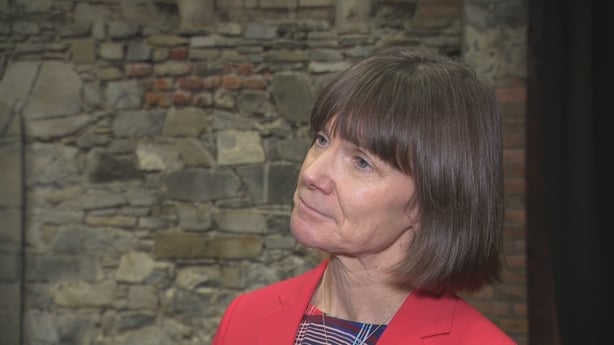A nurse who is living with HIV has said that her life has turned a corner since she decided to speak out about her status.
Aoife Commins was diagnosed in July 2020 - during the Covid-19 pandemic - while living in Australia.
She now works as a nurse in Galway in infectious diseases, sexual health and a HIV clinic.
Ms Commins said she believed it was "a blessing in disguise" when her parents found out because she got to talk about her situation.
She shared her story as part of a campaign by the Health Service Executive to explain advances in HIV treatment and to highlight how delaying going to the doctor is often related to fear of diagnosis and stigma.
She said that after the initial shock of being given the news, she knew from being a nurse and having the education from being diagnosed that she was going to live a normal life.
HIV was not going to affect her or her future, like having children or future partners, she added.
Ms Commins explained that the biggest and scariest aspect was the stigma surrounding the virus and how much misinformation there was, even in healthcare.
We need your consent to load this rte-player contentWe use rte-player to manage extra content that can set cookies on your device and collect data about your activity. Please review their details and accept them to load the content.Manage Preferences
She said she felt there was a big weight on her shoulders and she could not talk to people about what happened.
The best way to deal with the misinformation, she said, was to tell everyone and be an activist, describing the response since coming out publicly as massively positive.
The HSE said a recent survey found that seven in ten people did not know that when a person living with HIV is on effective treatment, they cannot pass it on to sexual partners.
Around 8,000 people are living with HIV in Ireland and there were 173 first-time diagnoses in 2023.
While the number of first-time diagnoses has been reducing, almost two in five people were diagnosed at a late stage in 2023.
National Clinical Lead of the HSE Sexual Health Programme, Dr Fiona Lyons, said that a late diagnosis can result in damage to the immune system.

Ms Commins explained that she had tested negative for HIV a short time before her diagnosis.
"I was seeing a partner for about six weeks and we'd both been tested ... gotten the all clear, everything was negative, and we started having unprotected sex.
"I think within the same week we both just happened to donate blood. About a few days after the donation ... he'd been called in because he tested positive for HIV," she told RTÉ's Oliver Callen.
"After the initial shock of that, I was like how did this happen because we both had been tested, but there's a six to eight week window period with HIV where it can take the antibodies a bit of time to build up in the blood so you can test negative within that window period.
"He had gotten tested about two weeks after exposure and was told everything's negative. He wasn't told to come back and get a retest after that six-week period and unknowingly he had HIV ... and unfortunately I had also been infected.
Ms Commins was 24 years old at the time and described finding out as "very weird" and "rough".
She said that she kept saying she wanted to tell her friends, wanted to talk about what had happened and wanted to educate people, but he kept saying "this is my diagnosis too, I don't want people to know."
"I would tell a few friends in secret, but then I'd feel guilty about talking about his diagnosis too," she said.
We need your consent to load this rte-player contentWe use rte-player to manage extra content that can set cookies on your device and collect data about your activity. Please review their details and accept them to load the content.Manage Preferences
After returning to Ireland and moving in with her parents, Ms Commins said that she wanted to tell them because it was "hard" as "we would be sneaking off to get our bloods done or get our meds".
Her mother and father learned of her diagnosis while she and her then partner were away.
"We were on holidays and mum had gone into my room to get a nail file and she just happened to see the bag of meds in my bedside locker and she saw I had a pseudonym ... because I was working in the hospital as a nurse ... that's how mum and dad found out.
"I think it was a blessing in disguise because ... I got to talk to them about it," she added.
Ms Commins said that she is in a new relationship, her partner does not have HIV and it is a perfectly normal relationship.
HSE highlights advances in HIV treatment
The HSE's national campaign emphasises that when a person living with HIV is on effective treatment, the viral load is so low that it is not detected in their blood.
People living with the infection on effective treatment cannot pass it to sexual partners.
Effective treatment in pregnancy also prevents infection in babies.
The 'You, Me & HIV' campaign emphasises that the virus is not passed on from kissing, hugging, shaking hands or from using the same cups, plates or toilet seats.
It points out that HIV and AIDS are not the same thing.
AIDS is a group of illnesses in the late stage of HIV infection.
Most people with HIV will not develop AIDS-related illness because of the advancements in treatments.






